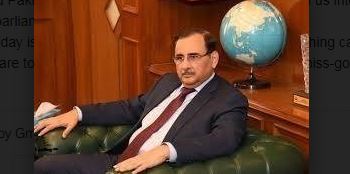DNA
Islamabad, Sept. 25: The Federation of Chambers of Commerce and Industry of Pakistan Businessmen’s Group (BMP) has fully supported the call of the United Nations as well as the Prime Minister to ease the debt pressure on Pakistan suspending international debt repayments and restructuring loans to provide immediate humanitarian aid to the flood-affected country.
Former FPCCI chairman and BMP chairman Mian Anjum Nisar has backed Prime Minister Shehbaz Sharif’s call on the international community to cancel Pakistan’s debts as the devastating flood shattered the economy of the developing nation. The world community should think about some sort of debt cancellation for Pakistan, as most of its income is spent on servicing debt, which makes it very vulnerable, he said.
He said the central bank’s foreign exchange reserves have fallen sharply over the past two months, mainly due to external debt servicing. He argued that creditors should consider debt relief so that Pakistan can prioritize funding its disaster response over loan repayments. Payments from Pakistan could be suspended at the earliest to free up fiscal space for urgent disaster response and recovery, which has been compounded by the catastrophic floods, he added. He also proposed debt restructuring or swaps, whereby creditors would waive repayments in return for Pakistan agreeing to invest in climate-resilient infrastructure. Pakistan, whose external debt totals around $100 billion, was grappling with a balance-of-payments crisis that strained its ability to repay its loans even before the recent unprecedented floods. The country, which has been hit particularly hard by the global commodity price spike, last month received a $1.1 billion bailout package from the IMF. The disaster magnified the challenges, affecting more than 30 million people and causing damage estimated at $30 billion. He called on creditors to find a longer-term solution that would involve reducing Pakistan’s debts to a sustainable level to allow the government to put the needs of the people first.
“The BMP calls for an outright cancellation of debt payments, saying poor countries must receive G20 debt relief. We fully support the government which has already reached out to bilateral creditors to see if it can get relief as the country pays a large portion of its taxes to foreign creditors.
Last year, Pakistan disbursed $11.6 billion to lenders, more than its central bank currently has in its reserves, he added. “It is very welcome that Pakistan has called for a moratorium on interest payments, as most of its debt consists of loans, which are borrowed to repay previous loans, trapping them in a vicious circle of debt. .”
The former FPCCI president said the country’s reserves had dwindled due to scheduled external debt payments. Although, in the past few weeks, the central bank also received some inflows, but these inflows were lower than the outflows, due to which the foreign exchange reserves recorded a sharp decline.
He called on the world community to think about complete debt cancellation for countries like Pakistan, which will help them cope with post-flood suffering. He observed that Pakistan lacks fiscal space and an adequate health system. Therefore, the most appropriate response that the IMF, World Bank and G20 countries can give, at this time, is forgoing lending instead of temporary relief, he said.
He pointed out that the interim debt relief on principal and interest is of no benefit, as the period of suspension of debt relief will only last a few months and all debt service falling due at during this period will be consolidated into a new loan on which the repayments will start again after a short period, to be made over three years. He asked them to give grants to Pakistan instead of loans. He said debt service would take up more than two-fifths of the country’s total budget as it is the top category of spending in FY23.
The former FPCCI chief says the country’s economy is suffering unprecedented damage under the government’s controversial deal with the International Monetary Fund as it wreaked havoc on industry by triggering a tsunami unbearable rise in the price of public services. The government has also put Pakistan in debt to the point of crisis, and has now brought us to a situation where the central bank is made completely irresponsible to the Pakistani parliament, which does not seem healthy.
What businessmen see today is a very worrying collapse without any corresponding ability to increase direct taxation or really widen the tax net. As a result, we are now totally exposed to debt, impoverishment and bad governance on an epic scale, he said.

